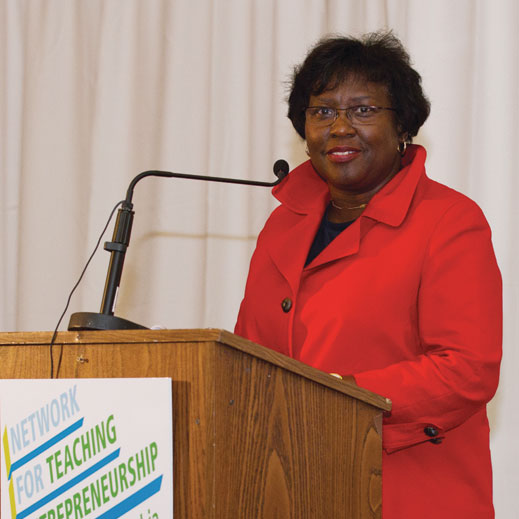Growing up in Columbia, South Carolina, Sylvia Watts McKinney saw how so-called urban renewal displaced low-income families. “I would see communities—parents and their children, the elderly—relocated to poverty-stricken areas,” she says. “They didn’t understand what was happening. Personally, I didn’t feel these Americans had voices.” Today McKinney helps thousands of Philadelphia middle- and high-school students find their own voices through entrepreneurship.

McKinney studied political science at the University of South Carolina and was shopping for a grad school when she visited 77 Mass. Ave. She remembers “the feeling of the doors, these larger-than-God-doors, and the presence of power.” She sat in on a class taught by architecture and city planning professor Tunney Lee, participating in a discussion about including residents in the design process for low-income housing. “At that time, Columbia was not a multicultural, ethnically diverse community,” she recalls. “Here was this Asian professor. I looked around. People looked like me, people didn’t look like me, and we’re having this dialogue. Now I’m in this global community. I thought, ‘This is where I belong.’” She immediately applied to MIT and was accepted.
“My moral core came from Larry Susskind and Frank Jones,” McKinney says of her city-planning professors. “Working with them helped me develop my sense of caring, my sense of passion, and my need to continue to learn.”
After graduating from MIT, she got a job as a budget analyst in the Massachusetts executive office of administration and finance. She then worked for a real-estate development company negotiating loans so that low- and moderate-income families could own their homes. She later served as chief of staff for the Massachusetts Secretary of Transportation and Construction. As executive director of Boston’s Museum of African American History, McKinney oversaw its transformation. “We had the opportunity to convert these buildings into monuments telling historically accurate stories,” she says.
McKinney now manages the Philadelphia chapter of the Network for Teaching Entrepreneurship, coördinating 200 volunteers working with 50 principals and teachers and a thousand students. “We teach children who are going to school in low-income communities how to be in charge of their lives through innovation,” she says. “The kids know what they want to do. We give them a skill base and an entrepreneurial mind-set.”
McKinney and her husband, a corporate attorney, have a teenage son who shares his mom’s passion for tennis, music, and world travel. And McKinney herself hasn’t forgotten what it was like to start her own journey: “I’ll always remember how hard it was to open those doors at MIT—and how happy I am that I went through them.”
Keep Reading
Most Popular
Large language models can do jaw-dropping things. But nobody knows exactly why.
And that's a problem. Figuring it out is one of the biggest scientific puzzles of our time and a crucial step towards controlling more powerful future models.
The problem with plug-in hybrids? Their drivers.
Plug-in hybrids are often sold as a transition to EVs, but new data from Europe shows we’re still underestimating the emissions they produce.
How scientists traced a mysterious covid case back to six toilets
When wastewater surveillance turns into a hunt for a single infected individual, the ethics get tricky.
Google DeepMind’s new generative model makes Super Mario–like games from scratch
Genie learns how to control games by watching hours and hours of video. It could help train next-gen robots too.
Stay connected
Get the latest updates from
MIT Technology Review
Discover special offers, top stories, upcoming events, and more.